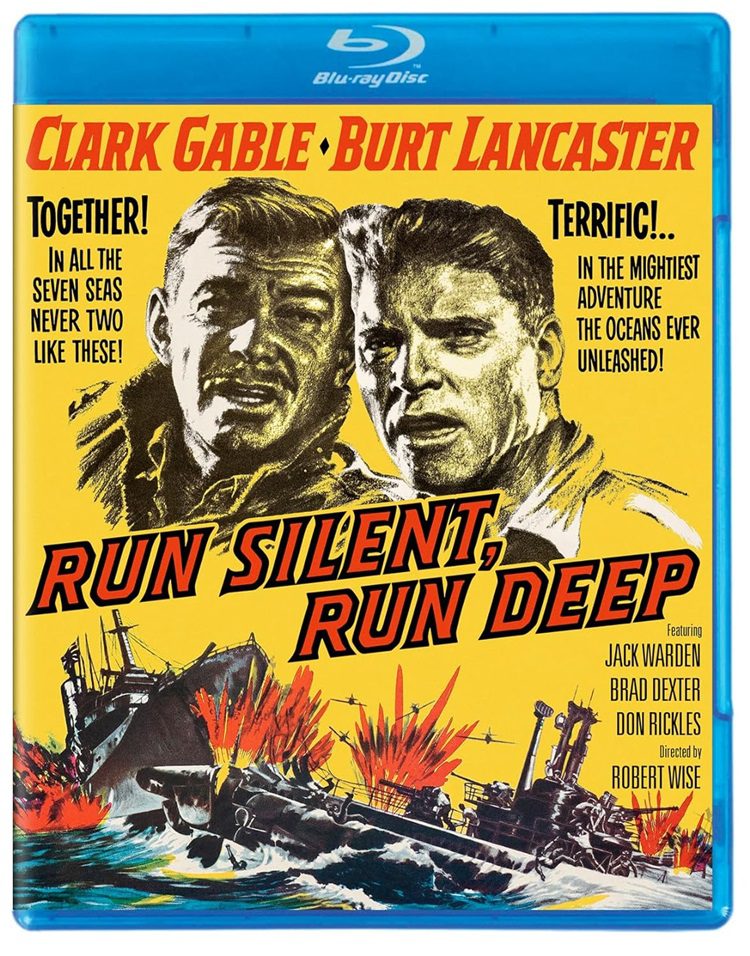
Run Silent, Run Deep (1958) is the story of two frustrated men. We open with the first man’s frustration. Commander Richardson (Clark Gable) captains a submarine running maneuvers in Japanese waters during WWII. He spots a destroyer, the Akizake, but it spots him, too, and is quicker on the draw. He loses the ship but survives.
Buy Run Silent, Run Deep Blu-rayAfter a year at desk duty, he broods over the encounter. He thinks he has a plan to defeat the Akizake, which has sunk several subs since his. Then a ship comes into Pearl Harbor and needs a new commander. Richardson goes to the board to pitch his case, hoping to finally get his revenge.
Which leads to the second man’s frustration, Lt. Bledsoe (Burt Lancaster.) With his captain wounded, he was an obvious pick to lead the sub. His men love him; they’ve even sewn a captain’s badge on his jacket. But it’s not to be. Richardson has taken over the command. Worse, when Bledsoe asks to leave the ship, Richardson refuses. So he doesn’t get the position and gets to play out his humiliation in front of the men he has to lead. The rest of the drama plays out as these two angry, frustrated men balance out their private frustrations with their war-time duties.
Richardson is not a popular captain. Nor does he care to be. He has a plan, and as a captain doesn’t concern himself with the feeling of his subordinates. He drills them, in dangerous maneuvers. Incessantly. And when some Japanese ships present themselves as targets… he demurs. He orders the sub to go around.
The crew thinks he’s a coward. They even contemplate mutiny, which Bledsoe nips in the bud. But an interesting thing happens. The next time they encounter the enemy, he confronts them head on. They succeed using just the maneuvers he’s been drilling them on.
Suddenly, he’s an old genius, and the film reveals dimensions beyond its already impressive military action. The audience is primed to sympathize with Lancaster’s character, but Gable turns out to be, at least for the moment, right. Maybe the popular officer with the men’s ear is too close to them to be focused on the real mission of defeating the enemy.
Run Silent, Run Deep was directed by Robert Wise, a classic Hollywood filmmaker with a wildly diverse filmography. He edited Citizen Kane and moved on at RKO to work with Val Lewton as a director on The Curse of the Cat People and the superb The Body Snatcher. Later, he moved up and up in the film world, making The Day the Earth Stood Still, The Haunting, and The Sound of Music. He was a versatile filmmaker, and Run Silent, Run Deep is a taut, briskly moving ride, clocking in at 93 minutes, without a wasted second.
Most of the action is, of course, aboard a submarine. A real submarine was used for external shots. I’d guess the interior shots were sets, but they’re remarkably convincing, as are the gadgets and materiel the actors use acting out their submarine battles.
Wise maintains a remarkable level of tension in these scenes. Even as I can tell I’m looking at models and can see the fishing line that is dragging the torpedoes through the water, I was caught up in the action. And the performances. Clark Gable is clearly not at his prime (there are some scenes you can see him trembling, maybe from Parkinsons, maybe from alcohol abuse). Burt Lancaster looks enormous and like he can tear apart anyone in the room. He’s always a force of subdued, burgeoning energy.
Run Silent, Run Deep works as a military action film and as a taut drama. It has a lot of the classical Hollywood touches (many of the crew are character actors, including Don Rickles) and it has an interesting dilemma for the audience: which of the frustrated men is more justified in their actions, which don’t always fit military protocol? Beautifully helmed, beautifully shot, Run Silent, Run Deep might not be an all-time classic, but it’s an example of the routine quality that the studio system, at its height, could put out.
Run Silent, Run Deep has been released by Kino Lorber Studio Classics. Extras on disc include a commentary by Steve Mitchell and Steven Jay Rubin, who write about depictions of combat and the military in film.